Coronavirus: Primary schools back but mixed picture on turn-out
- Published
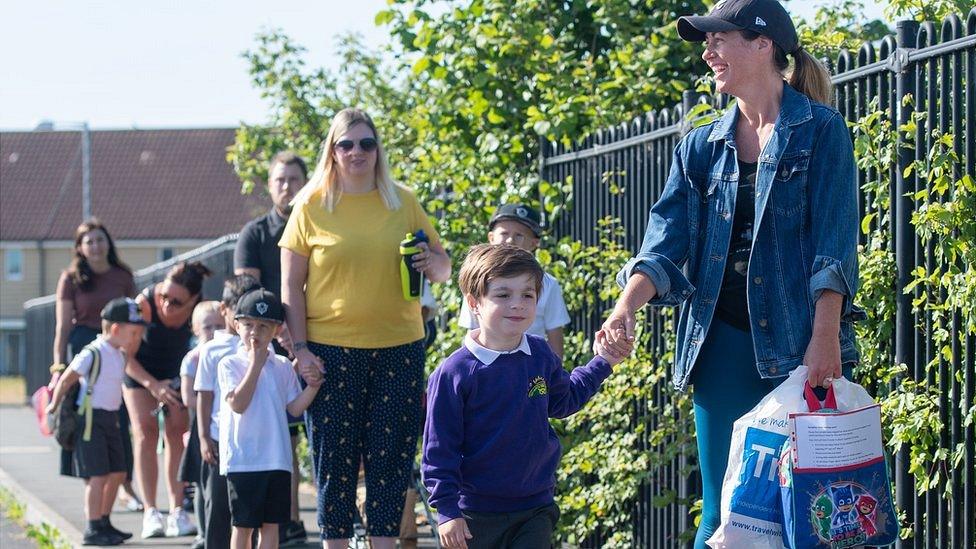
Parents bringing their children back to school on Monday in Norfolk
Head teachers are reporting "highly variable" levels of attendance, ranging from 40% to 70%, as primary schools in England bring back more pupils.
Geoff Barton, leader of the ASCL heads' union, says the return has been "very mixed" - with some schools not yet open and some children staying away.
Children in Reception, Years 1 and 6 are the first groups able to return.
It comes as lockdown measures are eased in England, including groups of six people being allowed to meet outside.
Schools have remained open throughout the coronavirus restrictions for the children of key workers and vulnerable children - but from Monday more than two million more pupils have been invited back.
Latest government figures show 39,045 people with the virus have died in the UK, across all settings. Health Secretary Matt Hancock said there had been a day-on-day increase of 111 deaths and 1,570 new positive tests.
An additional 445 deaths have been added to the overall death toll in the past day. The increase is explained by the retrospective inclusion of some patients whose tests were carried out by commercial partners, rather than the NHS or Public Health England.
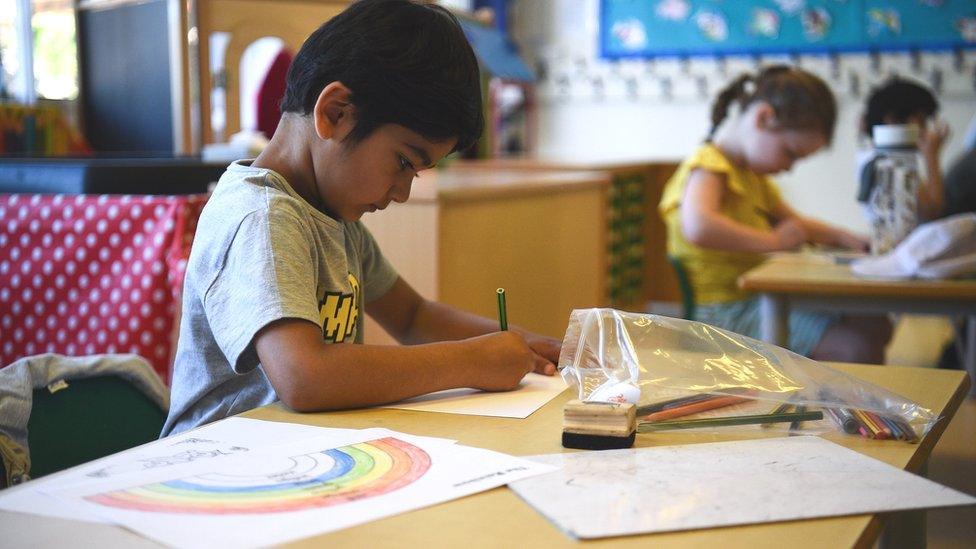
The first wave of primary school pupils has returned to school
The head teachers' leader says the "first impression" has been of a very varied local picture - with not all schools either open or bringing back pupils as outlined in the government's plans.
Some local authorities have not yet started to bring back more pupils, some schools have limited space, some are still training and not all staff are available, he said.
"Caution is the watchword, and everybody is approaching this task with the safety of pupils and staff as their absolute priority," said Mr Barton.
A survey from the National Foundation for Educational Research suggested almost 50% of children would be kept at home by parents.
Mr Barton's early feedback suggests ranges of between 30% and 60% of pupils not attending school.
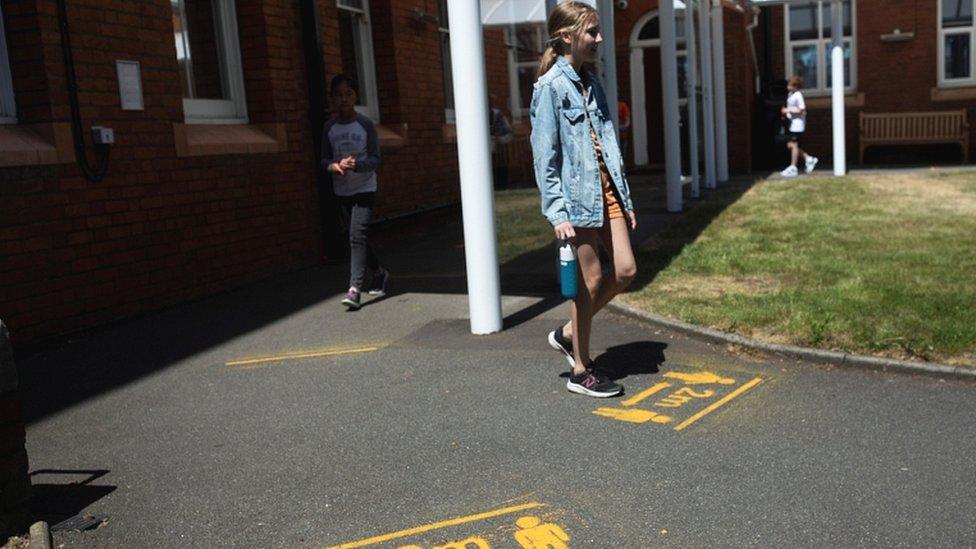
Social distancing markers have been added to school life
But he said more key workers' children seemed to be coming in and he expected the overall numbers to increase as "more parents become confident".
The biggest teachers' union, the National Education Union, has warned it was not yet safe to open schools - and the union's co-leader, Kevin Courtney, said delaying the wider opening of schools would "make our communities safer".
Education Secretary Gavin Williamson said children needed to catch up with missed lessons and at school they "will be with their teachers and friends again".
"I'm excited to see my friends and see everyone but not excited for the work," says 11-year-old Sean, returning to school in Mortlake, West London.
The view from the first morning back
BBC News education reporter Judith Burns describes the return to school:
"You look like you've grown," says teacher Catherine Hughes to a reception pupil who hasn't been in school since March.
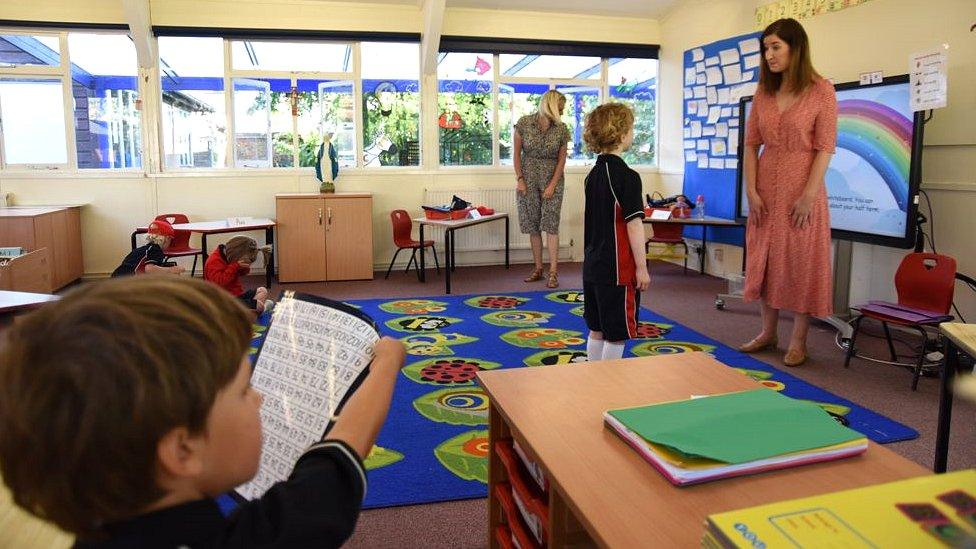
Pupils have to learn a new way of behaving at school
"Are you excited to be back?" Helen Frostick head of St Mary Magdalen's Catholic primary school in Mortlake, West London asks another.
About half of those who could have returned have taken up their places, alongside 15 children of key workers who have continued to come into school throughout the lockdown.
The classrooms have been completely reorganised, with desks in rows, facing forwards, instead of pushed together into big tables.
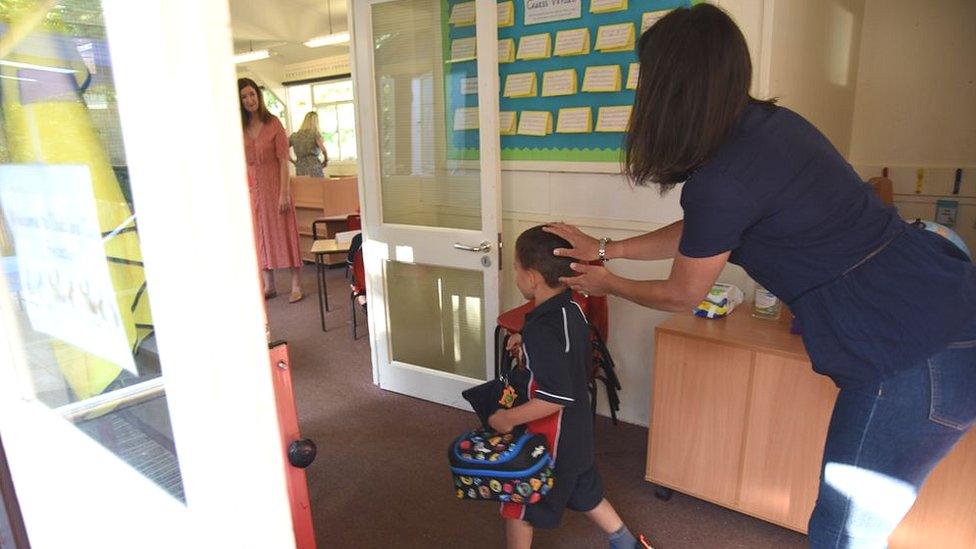
Parents say goodbye for the first Monday morning back in 10 weeks
There's lots of hand washing and the windows are open to let in fresh air.
The school has split each class into two separate bubbles with one half in on Monday and Tuesday and the other on Thursday and Friday, which allows for a deep clean on Wednesdays.
In the Reception class each table is separate, with its own tray of equipment so that the children don't need to get out of their seats so much, says teaching assistant, Clare Gordon.
"It really is best for the family," says mum Sophia as she brings her two sons to school.
She has managed to do some home schooling with the boys over the past few weeks but it hasn't always been easy.
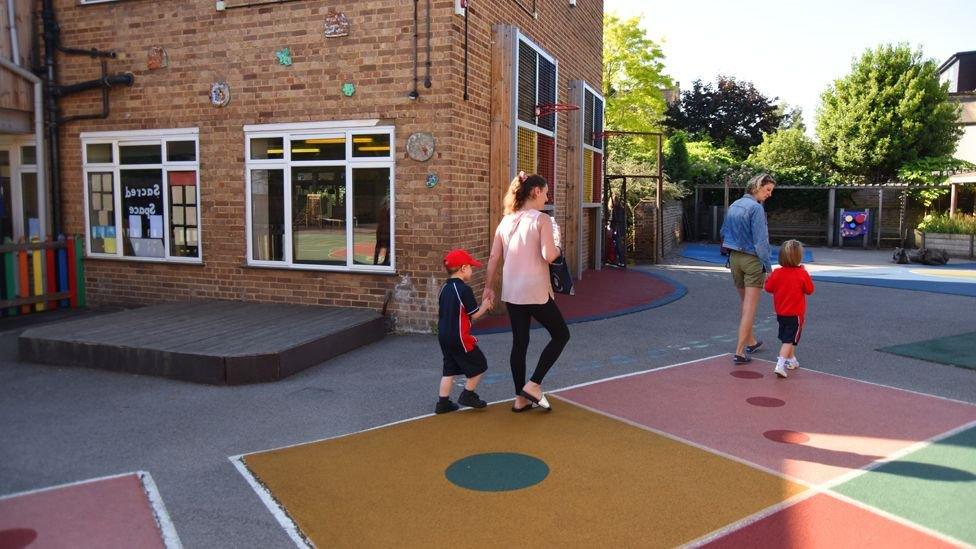
A socially distanced first morning back in school
"I was 10% worried but 90% thinking it was the right thing to do," says Julia, who has just dropped off her son.
"The main thing is for normality and for his mental health. He needs the interaction with his friends. He's been begging to come back," she says.
Staying home
A survey from the National Foundation for Educational Research suggested approaching half of families would keep their children at home. It expected that:
46% of parents will keep children at home
50% of parents in schools in disadvantaged areas will keep children at home
25% of teachers are likely to be absent because of health issues for themselves or their families.
Can children catch and spread coronavirus?
Jane Reid, a parent from York, said it was still not safe for her son to go back to school, saying: "It's a definite no from me.
"Plus, the contradictory information is infuriating. I can take him to school, but can't get his hair cut."
"How can I send them to school now, knowing it will be impossible for teachers to implement social distancing rules properly?" asked Valerie Brooker from Haslemere in Surrey.
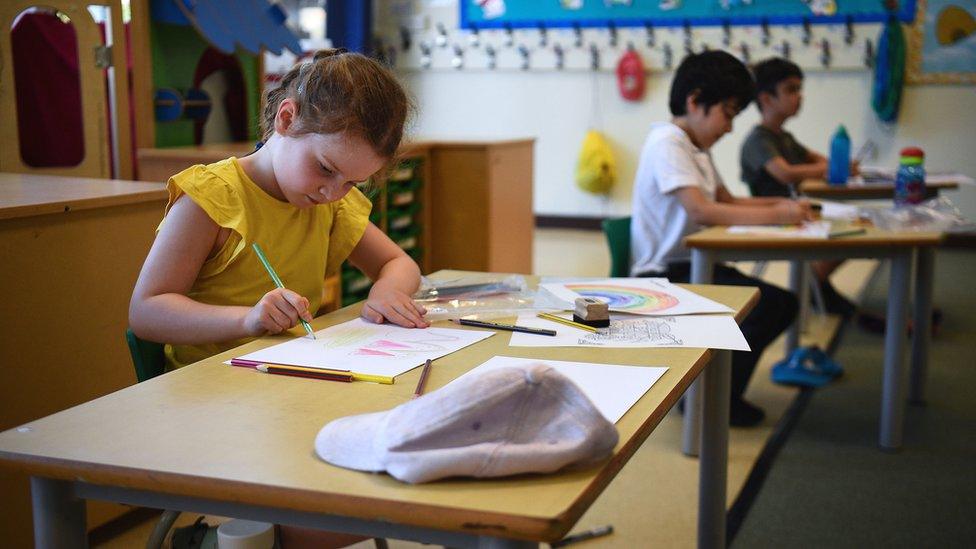
Pupils have returned to find a different kind of classroom
In other developments in England:
Those shielding since lockdown began 10 weeks ago will be allowed outdoors with a family member or to meet one other friend
Groups of up to six people from different households can meet in parks and private gardens, as long as they remain two metres apart
People can exercise outside with up to five others from different households
Domestic competitive sport will be allowed behind closed doors
Outdoor markets and car showrooms can reopen, provided they have Covid-related measures in place
People are banned from staying at another address overnight unless it is for a specified reason, such as work or attending a funeral. But they can leave their homes without needing a "reasonable excuse"
The Association of Directors of Public Health, which represents council health figures, warned in the Guardian, external that restrictions were being relaxed too quickly as "the public is not keeping to social distancing as it was".
In Wales, people from two different households can meet each other outdoors. Groups of four to six people who are not in the same household can meet outdoors in Northern Ireland. And in Scotland members of two different households are already allowed to meet outdoors.
Parents are having to decide whether their children will go back to school
In Wales schools are not going back on 1 June, with no date set
In Scotland and Northern Ireland schools are going back from August

A SIMPLE GUIDE: How do I protect myself?
IMPACT: What the virus does to the body
RECOVERY: How long does it take?
LOCKDOWN: How can we lift restrictions?
ENDGAME: How do we get out of this mess?

For some parents the decision has been taken out of their hands. Lancashire County Council is among those saying it is not yet safe to open schools.
A mother in Lancashire, who wanted to remain anonymous, has described this as a relief as she did not want her child to go back, although her husband did.
A Suffolk school has built a teepee to allow social distancing
The way that schools are bringing back pupils has many local variations - spread out over the next couple of weeks and with many schools making their own arrangements over which year groups return and for how many days a week.
The day looked very different for those pupils who did return - with staggered drop-off times and children staying in small groups of no more than 15 pupils.
Ministers say opening schools will help with childcare for parents returning to work - and to help children catch up with missed lessons.
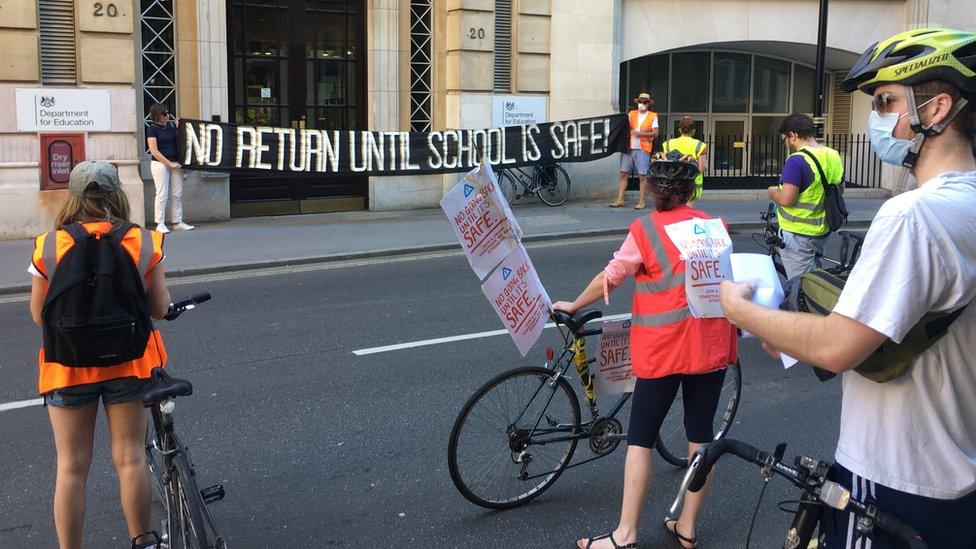
Protesters outside the Department for Education warned that opening schools was not safe
From 15 June secondary pupils will start to return, in Years 10 and 12 - and there are plans for all primary years to go back for the last month of term.
Nurseries and early years' providers are also opening, and a survey of 4,500 parents with young children, carried out by the Early Years Alliance, indicated a divided picture on take-up.
65% of nurseries and childcare settings open from 1 June
45% of parents planning to take up places
The biggest reason for parents not sending in their children was concern about safety.
Chief executive Neil Leitch warned the row over the prime minister's adviser Dominic Cummings travelling during lockdown threatened to undermine parents' trust on safety measures.
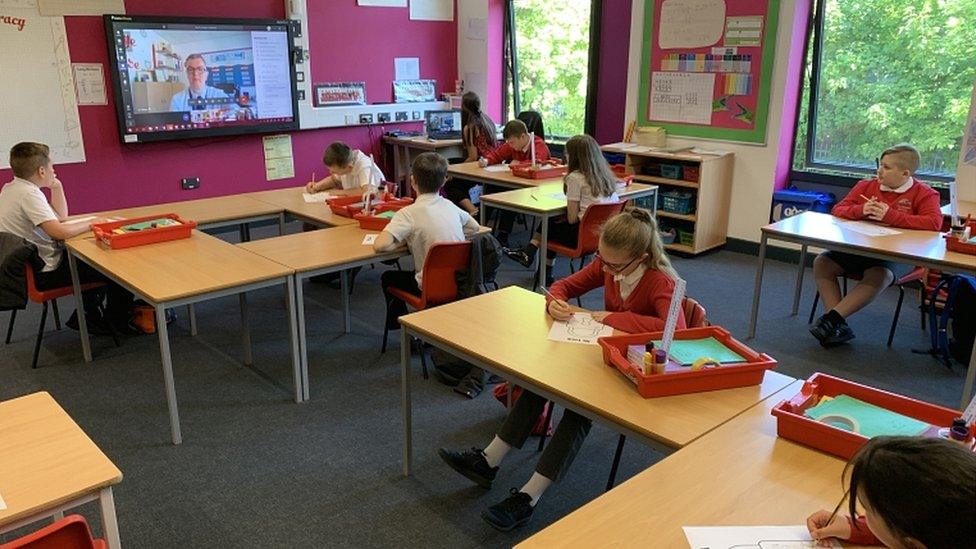
A school in Tamworth with pupils back in class
The concern was echoed by the Royal Society of Arts which published a survey of more than 2,000 adults in the UK showing 49% think the government is too caught up in the "Dominic Cummings affair" to be making the right decisions about schools.
"Despite the narrative from the government, the level of confidence for a return to schools remains low," said Paul Whiteman, general secretary of the National Association of Head Teachers.
Tulip Siddiq, Labour's shadow minister for children and early years, said the lower demand for childcare places would put nurseries under "extraordinary financial pressure" and "millions of childcare places could be lost in this crisis".

MISSING FOOTBALL? Watch The First Team
CORONAVIRUS SPECIAL: Take a look behind the scenes of the NHS

- Published1 June 2020
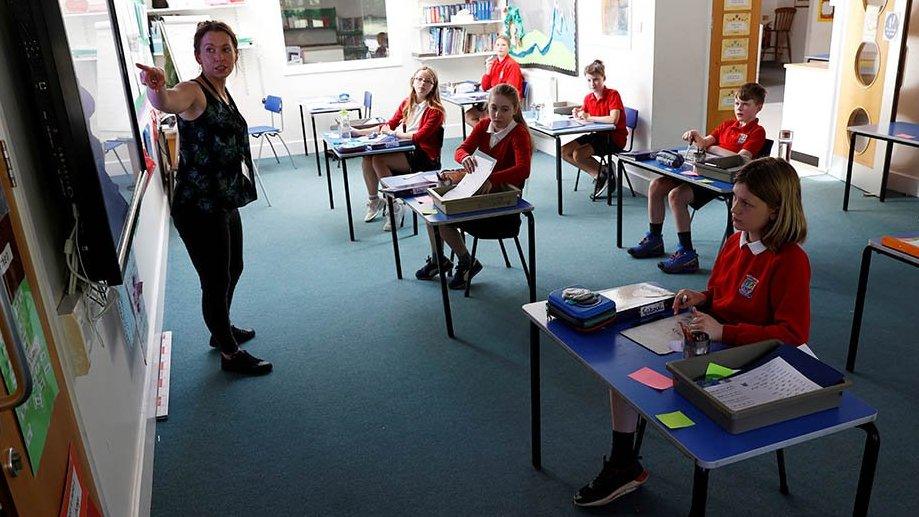
- Published1 June 2020
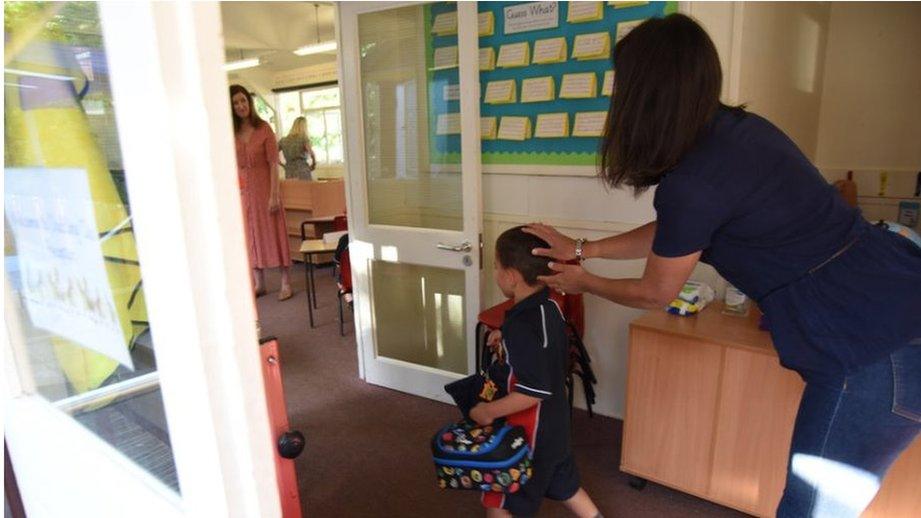
- Published1 June 2020
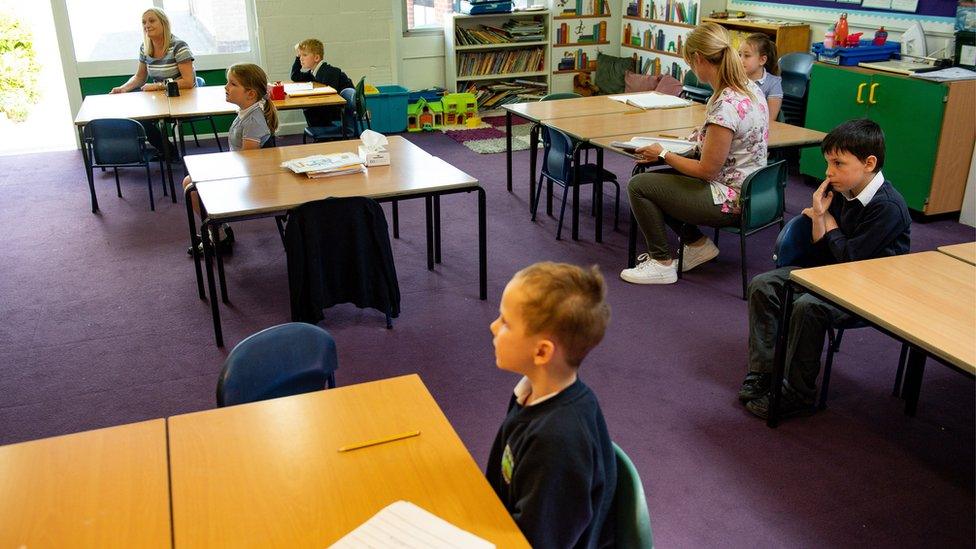
- Published23 February 2022
